People seeking 'where to vote' as Harris-Trump race reaches final stages
Polling sites see last-minute queries amid tight Harris-Trump race, record early voting figures.

Online searches for "where to vote" are peaking in the US, exhibiting heightened public interest in the voting process as Election Day approaches.
The uptick in inquiries comes amid intense campaigning from candidates Kamala Harris and Donald Trump, who remain in a close race for the presidency.
Many speculate that the search trends reflect both voter enthusiasm and possible anxiety about polling site access, especially as several states have adjusted polling locations in recent months.
The surge in last-minute voting queries mirrors record-breaking early voting numbers. Over 78 million Americans have already cast ballots, according to the University of Florida's Election Lab.
Early voting is especially prominent in swing states such as Georgia, Texas, and North Carolina, where both parties have worked to maximise voter turnout. Democrats have actively promoted early voting in their campaigns, while Trump’s camp has shifted to encourage early participation despite earlier reservations about the practice.
Both campaigns are now in a sprint finish. Harris has focused her final push in critical Sun Belt swing states, including Arizona and Nevada, where she has emphasised policies on climate action and healthcare reform. Trump, meanwhile, has held rallies with messages urging his supporters to remain vigilant about what he refers to as voting “irregularities.”
As the day for US presidential election nears, many people are wondering about the different options available to US citizens to cast their vote.
Here is the various voting options available
When to Vote
The actual date that voting day falls on is enshrined in the US contituted, It is helf every. four years on the first Tuesday of Novemeber. This year's election day is falling on November 5.
Many states offer flexible voting options to accommodate different needs, including voting in person on Election Day, early voting, and mail-in voting.
Voting in Person
For those voting on Election Day, polling locations will be staffed by election workers ready to assist. Voters will select their choices using either a paper ballot or an electronic device. It's essential to check with local election offices for specific polling locations, their opening and closing times, and any changes to polling places.
Early Voting
Some states permit early in-person voting. Voters should verify whether this option is available in their area and consult local election offices for details about early voting dates and rules.
Voting by Mail and Absentee Voting
While some states conduct elections entirely by mail, others allow voters to request absentee ballots if they cannot vote in person. Voters should confirm their eligibility for mail-in voting, as each state has different guidelines.
How to Return a Mail Ballot
When returning a mail ballot, voters have several options:
- By Mail: In some states, ballots come with a prepaid return envelope, while others require postage. It's crucial to fill out the return envelope completely before mailing it.
- Drop Box or In-Person: Many jurisdictions provide official ballot drop boxes where voters can submit their ballots without postage. Locations and availability of drop boxes can vary, so checking with local election offices is recommended.
Voter ID Requirements
Each state has its own voter ID laws, with most requiring identification for in-person voting. Voters must know the specific ID requirements in their state before heading to the polls. IDs can often be obtained from state motor vehicle offices, even for those who do not drive.
Finding Your Polling Place
Your polling place is where you vote in local, state, and federal elections. Voters should find out where their polling place is located, its hours, and whether they can change their polling location.
Can You Vote Online?
In federal elections in the US, online voting is not permitted.
Learning About Candidates
Voter guides and sample ballots include the candidates and the state or local issues up for a vote. Reviewing these materials before heading to the polls can help voters make informed decisions.



















COMMENTS
Comments are moderated and generally will be posted if they are on-topic and not abusive.
For more information, please see our Comments FAQ